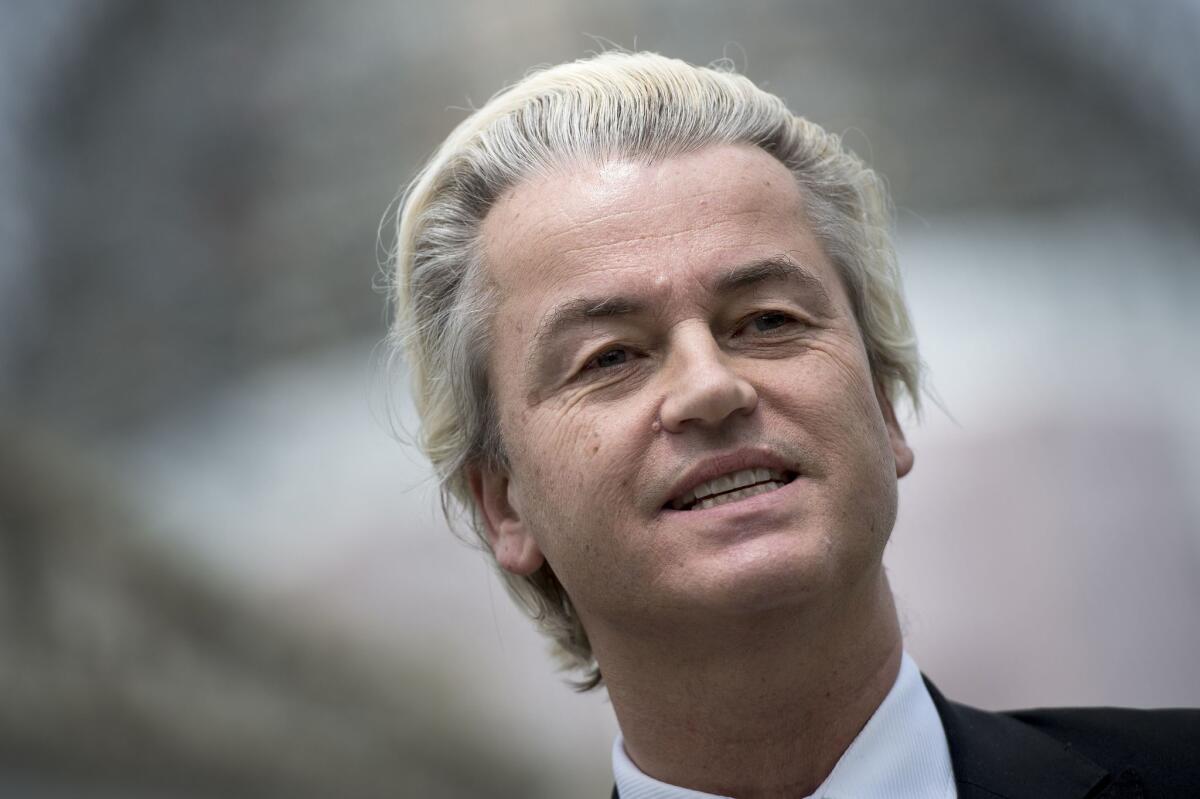Op-Ed: To understand Donald Trump, look to Europe

The leader of the Dutch far-right Freedom Party (PVV), Geert Wilders, is seen during a visit to Washington, D.C. in April. Wilders has advocated closing Dutch borders to stop what he has called an “Islamic invasion.”
- Share via
Donald Trump is a puzzle to political analysts. He’s commonly described as a creature of the far right, given his ultra-hard-line stances on Mexican and Muslim immigration. But polls commonly show that his strongest base of support is among moderate-to-liberal Republicans. Conservative pundits, moreover, complain that Trump has long been generous with donations and kind words for Hillary Clinton. His record of Republican heresies includes touting Canadian-style, single-payer healthcare, a 1999 proposal for a massive one-time “wealth tax,” support for the Clinton-era assault weapon ban, opposition to the Iraq War and blasting conservative proposals to reform Social Security. Add that together, and the term “RINO” seems mild.
If you want to understand Trump, look across the ocean. In an American context, Trump’s politics are incoherent. In a European context, Trump would fit more comfortably.
True, Trump’s naked appeals to nativist, anti-immigrant populism have parallels in American history, from Pat Buchanan in the 1990s to George Wallace in the 1960s and 1970s to Millard Fillmore’s Know-Nothing Party in the 1850s. Republican coalitions, however, have long placed a priority on pro-business, pro-free-market economic conservatism, social-issue causes like abortion and guns, and devotion to Constitutional principles such as limited government and federalism. Trump has little interest in any of these things. He’s cozy with big government, often using eminent domain to seize private homes for casino parking lots; he has totally ignored the Planned Parenthood undercover video controversy; and he has been griping about foreign trade since the 1980s (then it was Japan, now China).
What gives? If you want to understand Trump, look across the ocean. In an American context, Trump’s politics are incoherent. In a European context, Trump would fit more comfortably.
Many countries on the European continent pursue a “consensus” politics of the center-left and center-right. The moderates in power support a generous social-welfare state and more business regulation than Americans would accept, marginalize religious social-issue conservatives, and ignore crime and immigration.
By shunting so many issues beyond the pale of the mainstream, the elite fuel right-wing populist parties. Leaders like Geert Wilders in Holland, Marine Le Pen in France and their counterparts in Poland, Sweden, Belgium and Hungary give vent to the anxieties that establishment politicians would rather pretend did not exist. Accordingly, like conservatives in the United States, they stress security, including border security. But reflecting their working-class constituencies, European right-wing parties are often more anti-business, anti-trade and pro-social-welfare than American Democrats, let alone American Republicans.
There are historical and demographic reasons for the vast differences between the European and American right. Europe has denser populations, physically smaller nations that don’t share our ideas about state and local government, less vigorous Christian churches
(especially evangelical Protestant churches), and less tradition of immigration, gun ownership and frontier self-reliance. The European right wing traces its heritage in part to the old monarchists. Yet its populist leaders also echo mid-20th century dictators such as Mussolini and Hitler, who were simultaneously violent nationalists and self-proclaimed socialists who disdained individual rights and sought domination over private business and Christian churches.
In recent decades, Europe has experienced much heavier mass immigration from nearby Third World Muslim countries such as Algeria and Morocco, so that fears of culture clash that are mostly theoretical here are daily realities there. It has also seen independent nations drawn into the multinational bureaucracy of the European Union, raising real fears that national identities will fade away.
Perhaps the most significant difference between the American and European right is that the latter is almost entirely oppositional — an emotional response to the out-of-touch establishment. The American right, despite infighting and vigorous disagreement on specific policies, unites around a distinct set of political principles, with an abiding faith in free markets and individual liberty chief among them.
In that sense, Trump’s anti-immigrant, anti-trade, “Make America great again” nationalism may not be un-conservative, but it is literally un-American. It lacks the reverence for America’s founding principles and the Lincolnesque concern for individual rights to life and liberty that have long called American conservatives to the more hopeful better angels of our nature. It’s a reflex in place of a philosophy in a nation that was founded as a universal set of ideas rather than a local set of people.
Trump’s popularity should also be a wake-up call to Republican leaders not to take for granted the kitchen-table concerns of working-class voters who fear that the American system is rigged against them and that political correctness is blinding us to foreign powers that want to take advantage of our open society. The lesson of the European right is that these impulses don’t go away. If our governing class ignores them, less responsible voices will take up their banner, and those voices will not be so concerned with the principles that have made America different from Europe.
Dan McLaughlin is a lawyer in New York and a contributing editor at RedState.com.
Follow the Opinion section on Twitter @latimesopinion and Facebook
More to Read
A cure for the common opinion
Get thought-provoking perspectives with our weekly newsletter.
You may occasionally receive promotional content from the Los Angeles Times.










